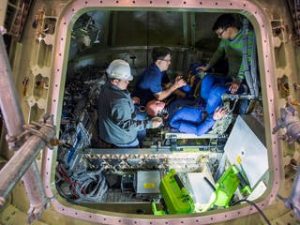Seal Beach, CA –Engineers at NASA’s Langley Research Center in Hampton, Virginia, will conduct nine water-impact drop tests to evaluate the Orion spacecraft and crew safety when they return from deep-space missions and touch down on Earth’s surface. Onboard will be two test dummies wired up to Diversified Technical System (DTS) data acquisition systems that will ride along to collect critical test data as NASA prepares Orion for its next mission, Exploration Mission-1. During Exploration Mission-1, the uncrewed Orion spacecraft will launch atop the Space Launch System (SLS) rocket, travel more than 40,000 miles beyond the moon and return at speeds up to 25,000 mph.
 Water-impact testing is one of many steps required to ensure Orion will meet the demands of sending humans to deep space for the first time and in the future on the journey to Mars, which is why extensive testing is so critical. Engineers at Langley will mimic various scenarios by dropping a mockup of Orion, coupled with the heat shield from the spacecraft’s first flight, into Langley’s 20-foot-deep Hydro Impact Basin.This will help NASA evaluate how the spacecraft may behave when landing under its parachutes in different wind conditions and wave heights. Langley has already conducted dozens of splash tests with DTS data recorders inside a less sophisticated capsule mockup, but this is the first time it will assess the higher fidelity Orion ground test article.
Water-impact testing is one of many steps required to ensure Orion will meet the demands of sending humans to deep space for the first time and in the future on the journey to Mars, which is why extensive testing is so critical. Engineers at Langley will mimic various scenarios by dropping a mockup of Orion, coupled with the heat shield from the spacecraft’s first flight, into Langley’s 20-foot-deep Hydro Impact Basin.This will help NASA evaluate how the spacecraft may behave when landing under its parachutes in different wind conditions and wave heights. Langley has already conducted dozens of splash tests with DTS data recorders inside a less sophisticated capsule mockup, but this is the first time it will assess the higher fidelity Orion ground test article.
Unlike many data recorders, DTS systems are so small and lightweight that they fit on-board and run autonomously to collect both structural and crew safety data.
For more information on how THP Systems and DTS can enhance your Data Acquisistion capabilitys please visit https://www.thp-systems.com/principles/dts/ or contact us at [email protected]




